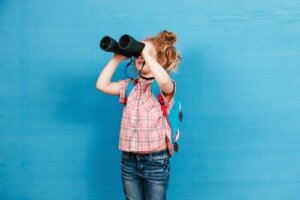Meaningful Learning: The Value of Learning By Doing


Written and verified by the psychologist Adriana Díez
Are you aware of everything that happens in your brain to create a memory? Have you ever thought about the mechanisms involved in learning? Do you think that seeing someone make a cake, ride a bike, or recite a poem is enough for you to be able to do it well yourself? Well, today, we’ll talk about one of the theories that addresses the question of how you acquire knowledge: David Ausubel’s meaningful learning theory.
Remembering something well involves some degree of repetition of what you see or hear. You only really learn when, after observing how it’s done, you turn on all your resources to do it autonomously.
That’s why schools should use a hands-on methodology, one in which children are the true protagonists instead of being passive receivers of information. Or, at the very least, use some combination of the two approaches.
Children need to own what they learn and be creative. They should be encouraged to explore and be excited about it. That’s a much better alternative to what often happens, which is that their curiosity slowly dies. Their delight in what they’ve learned, and what they still have left to learn, should be limitless. We want them to be excited about learning and investing their time in the process.
Children aren’t the only ones who benefit from this enthusiastic approach. Adults shouldn’t lose their curiosity either, that desire to learn, feed their minds, and broaden their knowledge. After all, you only truly learn when you involve yourself in the process and have a real interest in the information. Only then does what interests you imprint on your brain.
“Tell me and I forget. Teach me and I may remember. Involve me and I learn.”
-Benjamin Franklin-
Ausubel’s theory of meaningful learning
David Paul Ausubel was an American psychologist and educator who belonged to the constructivist movement. He focused on creating and organizing the learning process, starting from the knowledge that students already possess.
Among his theories, the meaningful learning theory is probably the most famous. According to Ausubel, true learning can only occur when new information has a meaning that connects it to the knowledge that students already have. Not because they’re similar, necessarily, but because they interact in such a way that builds a new, enriched meaning.
Therefore, Ausubel’s meaningful learning theory brings together each and every one of the elements, factors, and conditions that guarantee the acquisition, assimilation, and retention of content that children receive in school and are determining factors when it comes to that information being meaningful.
Conditions of meaningful learning
Therefore, in order to achieve true learning, you need to meet two conditions:
- A willingness to learn. In other words, to have a desire and curiosity about the information you’re receiving.
- The material is presented in a way that coincides with your cognitive development. Memory imprints in your mind allow you to introduce and fit new knowledge into pre-existing structures.
The first point is based on motivation and interest. You need to feel attracted to what you’re learning and excited about it. Your emotions have to be part of the process of learning and remembering. If they’re not, the information won’t be yours and won’t become a part of who you are.
The second condition is related with anchors. In other words, the structures that allow you to have a foundation for comparing new knowledge with prior knowledge and, thus, create a mnemonic device.
Ausubel’s theory also divides knowledge into three types:
- Subordinate. Information that you include as a new example of a more general term that you already know.
- Superordinate. Information that encompasses other, more specific information that you already have.
- Coordinate. The new concepts relate on the same level with others that you already know.

I learn, retain, and remember
Ausubel’s perspective inspires reflection about rote learning and how short-lived it is. That’s because memories acquired by rote learning fade away when you stop repeating them. Meaningful learning, on the other hand, is more robust because learning doesn’t occur through repetition. Instead, you learn by relating concepts and knowledge, which makes recalling much easier.
Therefore, meaningful learning happens when you’re truly ready, on a motivational and mental level, to acquire new information. You genuinely learn something when there’s a spark that captures your attention, activates your cognitive resources, and drives you to acquire and integrate something new.
Good teachers are the ones who create that spark, who inspire you and pique your interest over and over again.
This text is provided for informational purposes only and does not replace consultation with a professional. If in doubt, consult your specialist.








